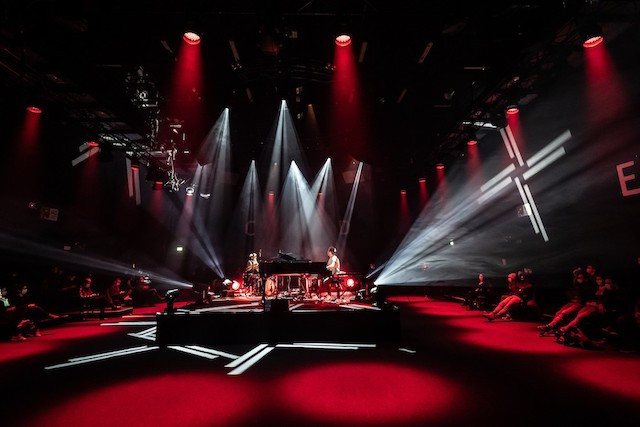When the Glass Museum concert ended at 9.30 pm on Wednesday evening, Rockhal CEO Olivier Toth’s smile was visible despite the mask.
“Yes, I am a happy man”, he says. “The first feedback is positive. Together with our whole team, we were looking forward to seeing the preparations become a reality. And it's a joy to have seen the audience again in our Club and the music on stage. Everything went as we had hoped.”
Onstage and backstage
After more than 11 months of absence (the last show was on 7 March, 2020), the "Because Music Matters" series of five concerts (all sold out) organised as a tribute to live music, started as well as one could hope.
First on stage was Belgian duo Glass Museum, who replaced at short notice the French pianist Mezerg, forfeited after a collarbone injury at the weekend. With music bordering on jazz, electronics and classical music, pianist Antoine Flipo and drummer Martin Grégoire, both from Tours, delivered an instrumental set that took the audience on a one-hour trip. From Turkey to Iceland, two influences clearly assumed, through the plains of North Africa.

Ticket-holders underwent a PCR and antigen test as a condition to be let in the concert. Photo: Maison Moderne
But what was perhaps even more scrutinised was the logistical aspect surrounding this series of concerts organised in collaboration with the health ministry—concert-goers had to undergo a PCR test before the concert. “The audience was disciplined and even enthusiastic. We have to thank all the people who made this event a success,” explained Toth.
No positive tests
If a small handful of demonstrators gathered in front of the concert hall, timidly pointing out that forcing people to test themselves to attend such an event was a way of limiting their freedom, this step drew few complaints from ticket-holders. They underwent two tests: an antigen and a PCR close to the venue, while waiting to take a third one seven days later for the follow-up. The results were delivered within 20 minutes.
“There was no positive result”, Toth said. As a result, everyone passed through the large detector, similar to those found in airports--a way of checking people without having to conduct a body search.
Once this stage had been completed, spectators were accompanied to their seats in a Rockhal-Club fitted out especially for the occasion. The audience was seated two metres apart around the 360° stage.
All this was done in a cosy atmosphere, without the bar being open and with the obligation to remain seated as long as possible. The setup was different from what regulars in concert halls are used to. But once the lights went out, the magic began to work again. Just like before the start of the health crisis. “We don't give you kisses, but it was a real pleasure” said pianist Antoine Flipo at the end of his set. A sincerely shared pleasure!
This article as first published on Paperjam.lu in French. It has been translated and edited for Delano.
